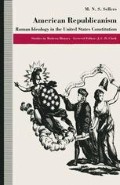Abstract
Of the Roman exempla taken as pseudonyms during the Constitution’s preparation and ratification debates,1 Marcus Tullius Cicero was most useful to America’s constitution-makers, because he had written in detail about the specific requirements of republican government2 Unfortunately, Cicero’s famous work De Re Publica was lost, but fragments of it survived. John Adams quoted them at length in the introduction to his Defence of the American Constitutions, 3 noting that as ‘all the ages of the world have not produced a greater statesman and philosopher united in the same character [than Cicero], his authority should have great weight’.4
Access this chapter
Tax calculation will be finalised at checkout
Purchases are for personal use only
Preview
Unable to display preview. Download preview PDF.
Notes
On Cicero in America, see Stephen Botein, ‘Cicero as a Role Model for Early American Lawyers: A Case Study in Classical “Influence”,’ Classical Journal 73(1978):313–21; Meyer Reinhold, The Classick Pages: Classical Reading of Eighteenth-Century Americans (University Park, Penn., 1975), 49–63; idem, Classica, 26–8, 96–7. For Cicero’s political thought and influence, see Neal Wood, Cicero’s Social and Political Thought (Berkeley, 1991); Conyers Middleton, History of the Life of Marcus Tullius Cicero (London, 1741); idem, A Treatise on the Roman Senate (London, 1747); F. R. Cowell, Cicero and the Roman Republic 2nd edn (Harmondsworth, England, 1962); James M. May, Trials of Character: The Eloquence of Ciceronian Ethos (Chapel Hill, NC, 1988); Guy Archard, Pratique rhétorique et idéologie politique dans les discours, ‘optimates’ de Cicéron (Leiden, 1981); D. R. Shackleton Bailey, Cicero (New York, 1971); Hans Baron, Cicero and the Roman Civic Spirit in the Middle Ages and Early Renaissance (Manchester, England, 1938); Pierre Boyancé, Études sur l’humanisme Cicéronien (Brussels, 1970); Karl Buchner, De re publica (Heidelberg, 1984); Thomas Allen Dorey (ed.), Cicero (New York, 1965); Manfred Fuhrmann, Cicero und die römische Republik (München, 1989); Christian Habicht, Cicero der Politiker (München, 1990); W. W. How, ‘Cicero’s Ideal in His “De Republica” ‘, JRS 19 (1929):24–42; C. W. Keyes, ‘Original Elements in Cicero’s Ideal Constitution’, AJP 42 (1921): 309–23; W. K. Lacey, Cicero and the End of the Roman Republic (London, 1978); Paul Lachlan MacKendrick, The Philosophical Books of Cicero (New York, 1989); Thomas N. Mitchell, Cicero: The Senior Statesman (New Haven, Conn., 1991); Herman Strasburger, Ciceros philosophisches Spätwerk als Aufruf gegen die Herrschaft Caesars (Hildesheim, 1990); Michel Valente, L’éthique Stoïcienne chez Cicéron (Paris, 1956); Neal Wood, Cicero’s Social and Political Thought (Berkeley, 1991).
John Adams’s diary as a student records him reading Cicero’s orations against Catiline out loud. Adams, Diary I:63 (21 December 1758),
For example, William Guthrie, The Orations of Cicero Translated into English (2nd edn, London, 1745). See Meyer Reinhold, The Classick Pages: Classical Reading of Eighteenth Century Americans (University Park, Penn., 1975), 50.
The name ‘Philippicae’ recalls Demosthenes’ similar speeches against Philip of Macedon, father of Alexander the Great and conqueror of Greece. See Cecil W. Wooten, Cicero’s Philippics and the Demosthenic Model: The Rhetoric of Crisis (Chapel Hill, NC, 1983). For the political background, see Hartvig Frisch, Cicero’s Fight for the Republic: The Historical Background of Cicero’s Philippics (Copenhagen, 1976). Also P. A. Brunt, The Fall of the Roman Republic and Related Essays (London, 1968); E. D. Rawson, Intellectual Life in the Late Roman Republic (London, 1985).
Cicero, Philippicae, I:1.1. Cf. idem, In Catilinam, III:1. Cicero delivered his first Philippic on 2 September 44 BC. Here, and in the speeches that followed (until the last Philippic on 21 April 43 BC) Cicero urged the Senate to declare Mark Antony a public enemy.
Ibid., 1:19.62. On Cicero, De Officiis, see E. M. Atkins and M. T. Griffin (eds. and trans.), Cicero on Duties (Cambridge, England, 1991); E. M. Atkins, The Virtues of Cicero’s De Offìciis (Cambridge, 1989); Paul Lachlan MacKendrick, The Philosophical Books of Cicero (London, 1989).
Cicero, De Offìciis, I:7.24. Cf. ibid., II:21.75.
Ibid., I:17.54.
Ibid., I:17.57.
Ibid., I:19.62.
Ibid., I:21.71.
Ibid., I:22.77.
Ibid., I:25.85.
Ibid., I:25.86.
Ibid., I:25.88. ‘One should employ reason and speech rationally, to do with careful consideration whatever one does, and in everything to discern the truth and uphold it.’ Ibid., I:27.94. The essential activity of the spirit is twofold: one force is appetite ... which impels a man this way and that; the other is reason, which teaches and explains what should be done and what should be left undone.’ Ibid., I:28.101. The appetites must be made to obey the reins of reason, so that people can be free from every sort of passion. Ibid., I:29.102.
Supra, p. 87. Cicero, De Legibus, I:6.19. On the American reception of Cicero’s natural law philosophy, see Cornelia G. LeBoutillier, American Democracy and Natural Law (New York, 1950); Thomas C. Grey, ‘Origins of the Unwritten Constitution: Fundamental Law in American Revolutionary Thought’, Stanford Law Review 30 (1978):843– 93; Charles F. Mullett, Fundamental Law and the American Revolution, 1760–1776 (New York, 1933); idem, ‘Coke and the American Revolution’, Economica 12 (1932):457–71; Roland Bainton, ‘The Appeal to Reason and the American Constitution’, in The Constitution Reconsidered, ed. Conyers Read (New York, 1968); Lester H. Cohen, ‘The American Revolution and Natural Law Theory’, JHI 39 (1978): 491–502; Edwin Corwin, ‘The “Higher Law” Background of American Constitutional Law’, Harvard Law Review 42 (1928):149; Sir Ernest Barker, ‘Natural Law and the American Revolution’, in Traditions of Civility: Eight Essays (Cambridge, England, 1948); Charles Grove Haines, The Revival of Natural Law Concepts (Cambridge, 1930); Benjamin Fletcher Wright, American Interpretations of Natural Law: A Study in the History of Political Thought (Cambridge, 1931).
Author information
Authors and Affiliations
Copyright information
© 1994 M. N. S. Sellers
About this chapter
Cite this chapter
Sellers, M.N.S. (1994). Cicero’s Res Publica . In: American Republicanism. Studies in Modern History. Palgrave Macmillan, London. https://doi.org/10.1007/978-1-349-13347-5_17
Download citation
DOI: https://doi.org/10.1007/978-1-349-13347-5_17
Publisher Name: Palgrave Macmillan, London
Print ISBN: 978-1-349-13349-9
Online ISBN: 978-1-349-13347-5
eBook Packages: Palgrave History CollectionHistory (R0)

